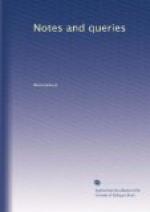TREBOR.
King’s College, Dec. 8. 1849.
MS. Sermons by Jeremy Taylor.
I venture to send you the following note, as embodying a query, which I am sure deserves, if possible, to be answered.
“Southey, Omniana, i. 251. Coleridge asserts (Literary Remains, i. 303.), that there is now extent, in MS., a folio volume of unprinted sermons by Jeremy Taylor. It would be very interesting to learn in what region of the world so great a treasure has been suffered to rust during a hundred and fifty years.”—Willmott’s Life of Bishop Jeremy Taylor, p. 87.
OXONIENSIS.
Papers of John Wilkes.
John Wilkes, it is well known, sent to the newspapers copies of Lord Weymouth’s and Lord Barrington’s Letters respecting the riots in St. George’s Fields in 1768. We Can easily conjecture how he did or how he might have, got possession of a copy of Weymouth’s Letter, which was addressed to the magistrates of Surrey; but Barrington’s letter was strictly official, and directed to the “Field officers, in staff waiting, for the three regiments of Foot Guards.” Has the circumstance ever been explained? If so, where? Can any of your readers inform me the exact date of the first publication of Barrington’s Letter in the newspaper? Is it not time that Wilkes’ Letters and MSS. were deposited in some of our public libraries? They would throw light on many obscure points of history. They were left by Miss Wilkes to Mr. Elmsley, “to whose judgement and delicacy” she confided them. They were subsequently, I believe, in the legal possession of his son, the Principal of St. Alban’s; but really of Mr. Hallam.
W.
John Ross Mackay.
The following is from a work lately published, Chronicles and Characters of the Stock Exchange, by John Francis:—
“‘The Peace
of 1763,’ said John Ross Mackay, Private Secretary
to
the Earl of Bute, and
afterwards Treasurer to the Ordnance, ’was
carried through and
approved by pecuniary distribution.’”
Will Mr. Francis, or any of your contributors, inform me where I can find the original statement?
D.
* * * * *
NOTES ON BOOKS, CATALOGUES, SALES, ETC.
Mr. Darling is preparing for publication a new edition of his Bibliotheca Clericales, a guide to Authors, Preachers, Students, and Literary Men. The object of this very useful publication, which deserves to be made a Note of by all who may have Queries to solve in connection with the bibliography of theology, cannot be better described than in Mr. Darling’s own words, namely, that it is intended to be “a Catalogue of the Books in the Clerical Library, greatly enlarged, so as to contain every author of any note, ancient and modern, in theology, ecclesiastical history, and the various departments connected therewith, including




